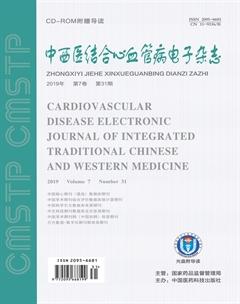甲状腺功能异常对凝血功能的影响
孔令达 张双元
【摘要】甲狀腺功能异常可导致凝血功能异常。现就甲状腺功能异常对凝血功能的影响进行探讨,为临床预防高危患者发生静脉血栓栓塞、抗凝治疗过程中出血、手术出血等提供重要理论依据,也为高危患者在治疗中及治疗后监测提供指导意义。
【关键词】甲状腺功能异常;凝血功能;凝血因子;静脉血栓栓塞;出血
【中图分类号】R581 【文献标识码】A 【文章编号】ISSN.2095.6681.2019.31..02
【Abstract】Thyroid disfunction can lead to abnormal coagulation function.To explore the effect of abnormal thyroid function on coagulation function, and to provide important theoretical basis for prevention of VTE, anticoagulation treatment of bleeding and surgical bleeding in high-risk patients in the future. It also provides guidance for the post-treatment and treatment of high-risk patients.
【Keywords】Thyroid dysfunction;Coagulation;Coagulation factor;Venous thromboembolism,Haemorrhage
甲状腺功能异常分为亢进,减退及亚临床紊乱。它们可能分别对凝血因子或凝血功能产生不同的影响,现对甲状腺功能对凝血功能产生的影响及一些产生影响的机制和出凝血事件中甲状腺功能状态具有的作用予以综述。
1 不同类型的甲状腺功能异常所产生的影响
1.1 甲状腺功能亢进
研究发现较高的fT4水平使FXIII,FⅡ,FⅪ和FⅨ水平增加,纤溶酶原减少,肝脏中凝血因子的合成被干扰而造成高凝状态[1]。高水平fT4也可增加纤维蛋白原,VWF,FⅧ,FX和PAI-1的水平,导致aPTT的缩短和凝块溶解时间增加[2]。甲状腺功能亢进使血凝块更紧密,血纤维蛋白溶解受影响[3]。因此甲状腺功能亢进可造成高凝状态。
1.2 甲状腺功能减退
甲状腺功能减退经左甲状腺素替代治疗前后,观察到FⅧ,FⅨ,VWF和纤维蛋白原的水平随fT4的升高而明显增加[4]。甲状腺功能减退期间纤维蛋白凝块的紧密性下降,纤维蛋白溶解增强[5]。在甲状腺功能减退中也观察到PAI-1水平的明显减低[4,5]。但也有研究发现轻度至中度甲状腺功能减退均与形成较致密的血纤维蛋白凝块及溶解受损有关,即与血栓前血浆纤维蛋白凝块表型有关[6]。可见关于甲状腺功能减退的研究结论存在矛盾。
1.3 亚临床甲状腺功能减退
亚临床甲状腺功能减退与血栓形成前状态相关,观察到原发性止血(MPV和血小板反应性升高),继发性止血(FVⅡ水平升高)和纤维蛋白溶解(PAI-1和t-PA水平升高),但t-PA的升高可能代表对纤维蛋白溶解不足的代偿性反应,经过左甲状腺素治疗后,发现MPV和血小板反应性的正常化,并且FⅦ,PAI-1和t-PA显著降低[7]。似乎亚临床甲状腺功能减退可造成一定程度的高凝状态。但也有研究监测了左甲状腺素纠正亚临床甲状腺功能减退前后凝血参数的水平,结果并未得到凝血参数有统计学意义的改变[8]。因此亚临床甲状腺功能减退对凝血系统可能只存在微小的影响。
1.4 亚临床甲状腺功能亢进
在Ordookhani等[9]的综述中提到,亚临床甲状腺功能亢进中发现较高的纤维蛋白原,D-二聚体水平,VWF,X因子,PAI-1,FVIII水平。血小板功能分析结果显示胶原/肾上腺素,胶原/ADP的闭合时间显著减少。表明亚临床甲状腺功能亢进的高凝性。但同时也发现了TAFI抗原水平降低,PAI-1水平升高,因PAI-1和TAFI同属纤溶系统的抑制剂,因此两种抑制剂之间的反向相关关系很复杂。由此看来,亚临床甲状腺功能亢进存在低凝性或不影响凝血方向。目前的发现更倾向于高凝状态,但需要更多的研究。
2 甲状腺功能在出凝血事件中的作用
2.1 静脉血栓栓塞
VTE的发病越来越被重视。高水平的fT4增加了FⅧ,FⅨ,纤维蛋白原和VWF的浓度,静脉血栓形成风险在这种机制下增加[10]。VTE发病风险随fT4 水平的升高而逐渐增加,即使fT4的水平是在正常范围的上限也被列为VTE发生的危险因素[11]。
2.2 出血性事件
近年来难以观察到因甲状腺功能异常所造成的明显出血事件。但一项研究发现VKA抗凝期间发生严重出血的患者在 fT4 水平低于 13 pmol / L时严重出血的风险增加了 5倍,然而这种效应是在 fT4 水平的正常范围内发现的[12]。因此在高危人群中似乎更易观察到因甲状腺功能所造成的出血事件。研究还发现甲状腺功能减退可导致获得性血管性血友病的发病,造成出血风险的增大[13]。
3 结 语
目前的研究表明甲状腺功能异常可对凝血功能产生不同影响,影响的机制复杂,因此在临床工作中应注意甲状腺功能异常可能造成的凝血功能改变,从而在一定程度上对高危患者进行临床干预或预防,避免或减少危险事件的发生,但目前的研究结论证据仍不充分,甚至存在矛盾之处,有待通过进一步高质量的研究进行明确。
参考文献
[1] Engelmann B, Bischof J, Dirk AL, et al. Effect of Experimental Thyrotoxicosis onto Blood Coagulation:A Proteomics Study[J].Eur Thyroid J 2015,4(suppl 1):119-124.
[2] Zaane B V,Squizzato A, Debeij J,et al. Alterations in coagulation and fibrinolysis after levothyroxine exposure in healthy volunteers: a controlled randomized crossover study[J].Journal of thrombosis and haemostasis:JTH,2011,9(9):1816-1824.
[3] Hooper JM,Stuijver DJ,Orme SM,et al.Thyroid dysfunction and fibrin network structure: a mechanism for increased thrombotic risk in hyperthyroid individuals[J].The Journal of Clinical Endocrinology & Metabolism,2012,97(5):1463–73.
[4] Horacek J,Maly J, Svilias I,et al.Prothrombotic changes due to an increase in thyroid hormone levels[J].European Journal of Endocrinology,2015,172(5):537-542.
[5] Stuijver D J F,Hooper J M W,Orme S M,et al. Fibrin clot structure and fibrinolysis in hypothyroid individuals: The effects of normalising thyroid hormone levels[J].Journal of Thrombosis and Haemostasis,2012,10(8):1708-1710.
[6] Mazur P,Soko?owski G,Hubalewska-Dydejczyk A, et al. Prothrombotic alterations in plasma fibrin clot properties in thyroid disorders and their post-treatment modifications[J].Thrombosis Research,2014,134(2):510-517.
[7] Lupoli R,Di Minno M N D,Tortora A,et al.Primary and Secondary Hemostasis in Patients With Subclinical Hypothyroidism:Effect of Levothyroxine Treatment[J].The Journal of Clinical Endocrinology & Metabolism,2015,100(7):2659-65.
[8] Anagnostis P,Efstathiadou Z A,Slavakis A,et al.The effect of L-thyroxine substitution on lipid profile,glucose homeostasis,inflammation and coagulation in patients with subclinical hypothyroidism[J]. International Journal of Clinical Practice,2014,68(7):857-863.
[9] Ordookhani A,Burman K D.Hemostasis in Overt and Subclinical Hyperthyroidism[J].International journal of endocrinology and metabolism, 2017,15(3):e44157.
[10] Debeij J,Van Zaane B,Dekkers O M,et al. High levels of procoagulant factors mediate the association between free thyroxine and the risk of venous thrombosis: the MEGA study[J].Journal of Thrombosis and Haemostasis, 2014, 12(6):839-846.
[11] Debeij J,Dekkers OM,Asvold BO, et al. Increased levels of free thyroxine and risk of venous thrombosis in a large population-based prospective study[J].Journal of thrombosis and haemostasis:JTH,2012,10(8):1539–46.
[12] Debeij J,Cannegieter S C,Van Zaane B,et al.Major haemorrhage during vitamin K antagonist treatment: the influence of thyroid hormone levels[J].European Thyroid Journal,2014,3(1):32–7.
[13] Stuijver D J,Piantanida E,Van Zaane B, et al.Acquired von Willebrand syndrome in patients with overt hypothyroidism: a prospective cohort study[J]. Haemophilia, 2014, 20(3):326–32.
本文編辑:李 豆

